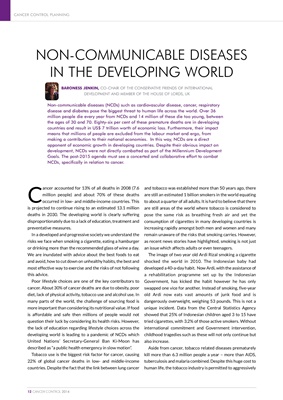
market tobacco in many parts of the developing world. Due
to a distinct lack of tobacco control policies and little
awareness of the health effects, they often target women
and children and distribute free cigarettes at sports and
music events. Tobacco is largely grown in developing
countries and the industry exerts enormous influence over
the presiding governments. According to the Bill & Melinda
Gates Foundation, if current trends are allowed to continue,
tobacco will kill more than 8 million people a year by 2030
and 80% of these will be in low- and middle-income
countries. Governments should be encouraged to introduce
strong restrictions on the tobacco industry and convince
them of the economic benefits of tobacco taxes.
As developing countries experience rapid social and
economic change they are likely to become "westernized".
This westernization effect can lead to a reduction in
infection-related cancers but can also contribute to an
increase in cancers associated with behavioural and lifestyle choices. In short, we run the risk of replacing old health
challenges such as a lack of food and shelter with new
western health risks such as poor diet and smoking. As diets
and lifestyles become more westernized, the risks of cancer,
and other NCDs such as diabetes and cardiovascular
disease, may also rise. On a visit to Sierra Leone last year, I
was struck by the fact that the closer we got to Freetown,
from the remote Guinea border where people were fit and
lean, that people, who were eating junk food from stalls in
the street, became noticeably fatter as we approached the
city environs. Currently overweight, those city dwellers are
moving rapidly towards obesity with all the added health
risks that, as we in the west know, pose massive problems in
the future. We must offset this with a clear agenda aimed at
educating populations about the risks of certain choices, just
as we do with our own nationals. Now, as westernization
begins to take hold, is the last opportunity to educate
populations and prevent habits from developing.
Whilst we should not neglect the fact that much of the
developing world is very young, the world's population is
also ageing. The world median age is expected to reach 38
years by 2050, an increase from 29 years in 2010, and the
number of people in the world aged 60 and over is expected
to almost triple to 2 billion by 2050. Whilst there is currently
a large gap between age expectancies in the developed and
developing countries, 80 years in Japan, 45 years in
Afghanistan and Zimbabwe, the rapid development we are
seeing in many countries will mean that populations grow
and live longer. Cancer, and most other NCDs, are
predominantly diseases of the elderly and ageing is a
fundamental factor in the development of cancerous cells.
As people in the developing world start to see longer lifespans due to development,
the incidence of NCDs will rise.
As well has threatening the lives of millions of people and
the social development of the developing world, NCDs
clearly pose a high risk to economic development. A recent
report co-authored by the Harvard School of Public Health's
David Bloom, estimated the cumulative loss of output to the
economy due to NCDs from 2011 to 2030 to be US$ 47
trillion. In 2008, it is estimated that 169.3 million years of
healthy life were lost globally because of cancer alone. In
areas of the world that are desperately trying to increase
their economic output, whilst facing extreme social
pressures, this situation quite simply cannot be allowed to
continue.
Since the introduction of the Millennium Development
Goals we have seen the number of people living in poverty
across the world halve, deaths from malaria have fallen by
one quarter and child deaths have fallen by 30%. The global
community, and Britain in particular, has much to be proud
of. However, challenges still remain and as we look towards
the post-2015 agenda, which the UK Prime Minister David
Cameron is spearheading, I firmly believe that we must look
closely at the impact of NCDs in the developing world.
The mortality and diseases burden from NCDs will
continue to increase if they are not addressed imminently.
The knowledge and vision exists to take the necessary action
but it requires the commitment of the international
community. Cancer can be reduced and controlled with
relatively simple measures based on evidence-led strategies.
If detected early, and treated adequately, cancers have a
relatively high chance of cure. However, programmes remain
under-funded and have been left off the development
agenda. To this end, I hope that these matters will be fully
debated over the next year and that consideration will be
given to entrench measures to combat NCDs into the post2015 agenda. l
Baroness Jenkin of Kennington is co-Chair of the Conservative
Friends of International Development and is active in a number
of development-related All Party Parliamentary Groups. She is
on the Board of UNICEF UK and is a Patron of Restless
Development. She has been a Conservative Peer in the UK
Parliament since January 2011.
CANCER CONTROL PLANNING
CANCER CONTROL 2014 13